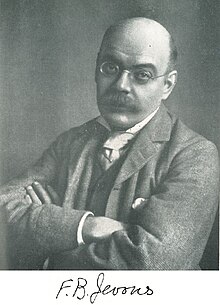Frank Jevons
|
Professor Frank Byron Jevons |
|
|---|---|
 |
|
| Vice-Chancellor of the University of Durham | |
|
In office 1910–1912 |
|
| Preceded by | The Very Revd Dr George William Kitchin |
| Succeeded by | Prof Sir George Hare Philipson |
| Master of Hatfield College, Durham | |
|
In office 1897–1922 |
|
| Preceded by | The Right Revd Archibald Robertson |
| Succeeded by | Professor Arthur Robinson |
| Personal details | |
| Born | 1858 Doncaster |
| Died | 1936 Radcliffe-on-Trent |
| Spouse(s) | Ellen Louisa Cox |
| Alma mater | Wadham College, Oxford |
| Profession | Academic and Vice-Chancellor |
Frank Byron Jevons (1858–1936) was a polymath, academic and administrator of Durham University.
He was educated at Nottingham High School and Wadham College, Oxford and appointed a lecturer in Classics at Durham in 1882.
He was the first Censor of St Cuthbert's Society from 1892 until 1897, a role he performed with "skill and humanity". In 1897 he was appointed as Master of Hatfield College where he remained until 1922. He also served as Vice-Chancellor of the university between 1910 and 1912 and Pro Vice-Chancellor between 1912 and 1914 and 1916 to 1921.
He was Professor of Philosophy between 1910 and 1930 and presided at the inaugural meeting of the World Congress of Philosophy in 1923. One of the last Victorian polymaths, in the twenty years before and after 1900, he gave himself successively to the study of classics, philosophy, sociology, history, anthropology, and comparative religion.
A portrait hangs in the refectory of Hatfield College.
He was concerned with social and national issues, especially the education of the working classes and of women.
He was author of eighteen scholarly texts some of which, for example A History of Greek Literature: From the Earliest Period to the Death of Demosthenes (1886), An Introduction to the Study of Comparative Religion (1908), and Comparative Religion (Cambridge Manual of Science and Literature) (1913) remain in print.
He also wrote on other fields in which subsequent technical advances have been radical and rapid, such as evolution. Such works understandably are no longer commonly in print, but they remain of interest for their clarity, logic, and sound representation of the perspective of his day.
Other writings available online include:[2]
...
Wikipedia
